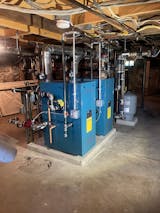The Benefits of Switching to a Biomass Boiler: A Comprehensive Guide
In today's world, where environmental concerns and sustainable energy solutions are becoming increasingly important, many homeowners and businesses are seeking alternatives to traditional heating systems. One such alternative that has gained significant attention is the biomass boiler. In this comprehensive guide, we will explore the various benefits of switching to a biomass boiler and how it can positively impact your energy usage, financial savings, and the environment.
Introduction
What is a biomass boiler?
A biomass boiler is a heating system that utilizes organic materials, such as wood pellets, agricultural residues, or dedicated energy crops, to generate heat. It operates by burning biomass fuel in a specially designed chamber, which then heats water or produces steam for space heating or other purposes. Unlike fossil fuels, biomass is a renewable energy source that can be sustainably harvested and replenished, making it an environmentally friendly alternative.
Environmental Benefits
Switching to a biomass boiler offers several significant environmental benefits.
Reduced carbon emissions: Biomass boilers produce significantly lower carbon emissions compared to traditional fossil fuel-based heating systems. Biomass fuel sources, such as wood pellets, have a lower carbon footprint because the carbon dioxide emitted during combustion is offset by the carbon dioxide absorbed by the trees during their growth.
Renewable and sustainable energy source: Biomass is a renewable energy source that can be continually replenished through responsible forestry practices and sustainable agricultural methods. Unlike fossil fuels, which are finite and contribute to greenhouse gas emissions, biomass offers a sustainable and long-term solution to meeting our energy needs.
Reduced reliance on fossil fuels: By adopting a biomass boiler, you decrease dependence on fossil fuels, such as oil or natural gas. This not only reduces the impact of volatile fuel prices but also contributes to energy independence and a more sustainable future.
Cost Savings
One of the key advantages of switching to a biomass boiler is the potential for substantial cost savings.
Lower fuel costs: Biomass fuel, such as wood pellets or agricultural residues, is often
less expensive than traditional fossil fuels. This cost advantage can lead to significant savings on annual heating expenses, especially in areas where biomass resources are abundant and readily available.
Potential government incentives and grants: Many governments provide incentives and grants to encourage the adoption of renewable energy systems, including biomass boilers. These financial support mechanisms can offset the initial installation costs and further enhance the cost-effectiveness of the switch.
Long-term financial benefits: Biomass boilers offer long-term financial benefits due to their high energy efficiency and stable fuel prices. As biomass is a locally sourced and renewable resource, it is less prone to price fluctuations compared to fossil fuels, providing homeowners and businesses with greater control over their heating costs in the long run.
Energy Efficiency
Biomass boilers offer improved energy efficiency compared to traditional heating systems.
Improved energy efficiency: Biomass boilers are designed to maximize energy conversion, ensuring a high level of efficiency in converting biomass fuel into heat. This efficiency results in reduced energy wastage and ultimately lowers overall energy consumption.
Potential for combined heat and power generation: Biomass boilers can also be configured for combined heat and power (CHP) generation, allowing simultaneous production of heat and electricity. This integrated approach maximizes energy utilization and further enhances energy efficiency, particularly for larger commercial or industrial applications.
Versatility
Biomass boilers are versatile heating systems suitable for various applications and settings.
Suitable for various applications: Biomass boilers are suitable for residential, commercial, and industrial applications. Whether you need to heat a single-family home, a multi-unit residential building, an office complex, or an industrial facility, biomass boilers can meet your heating requirements effectively.
Compatibility with existing heating systems: Biomass boilers can be integrated into existing heating systems with relative ease. They can work in conjunction with traditional boilers, allowing for a gradual transition or as a standalone system to replace outdated heating equipment. This versatility makes biomass boilers a viable option for retrofitting existing buildings or new construction projects.
Fuel Availability
Biomass boilers benefit from a wide range of biomass fuel sources and localized availability.
Wide range of biomass fuel sources: Biomass boilers can utilize various biomass fuel sources, including wood pellets, wood chips, agricultural residues, and dedicated energy crops. This diversity provides flexibility and enables users to choose the most suitable fuel type based on availability, cost, and specific heating requirements.
Local sourcing and reduced transportation costs: Biomass fuel sources are often available locally, which reduces transportation costs and supports local economies. By sourcing biomass fuel from nearby suppliers, homeowners and businesses can contribute to regional sustainability while minimizing the environmental impact associated with long-distance fuel transportation.
Heating Performance
Biomass boilers offer consistent and reliable heat output with adjustable controls.
Consistent and reliable heat output: Biomass boilers deliver consistent and reliable heat output, ensuring a comfortable and controlled indoor environment. The combustion process is carefully regulated, allowing for stable heat generation and maintaining desired temperatures throughout the heating season.
Adjustable controls for optimal performance: Biomass boilers come with adjustable controls, allowing users to fine-tune the heating system based on their specific needs. These controls enable precise temperature management, ensuring optimal performance and energy efficiency.
Reduced Maintenance
Biomass boilers require minimal maintenance compared to conventional boilers.
Minimal maintenance requirements: Biomass boilers have relatively low maintenance requirements, thanks to their robust design and advanced combustion technology. Routine maintenance tasks typically include regular ash removal and occasional cleaning of heat exchangers, which can be easily performed by homeowners or professional service providers.
Extended lifespan compared to conventional boilers: Biomass boilers are known for their durability and extended lifespan, often exceeding that of conventional boilers. This longevity is due to their design, which minimizes wear and tear and incorporates high-quality components that withstand the demands of biomass combustion.
Community Benefits
Switch
ing to biomass boilers can bring several benefits to the local community.
Boost to local economy through biomass production and supply: Biomass production and supply chains create economic opportunities at the local level. From forest management and biomass harvesting to processing, transportation, and distribution, biomass fuels can support regional businesses and job growth.
Job creation opportunities: The biomass sector offers job creation opportunities in various stages of the biomass supply chain, including biomass fuel production, equipment manufacturing, installation, and maintenance. This localized job creation contributes to local economic resilience and fosters a sense of community development.
Challenges and Considerations
While biomass boilers offer numerous benefits, it's important to be aware of the challenges and considerations associated with their adoption.
Initial installation costs: Biomass boilers may require a higher initial investment compared to conventional heating systems. Factors such as the size of the property, heating demand, and integration complexity can influence installation costs. However, it's essential to consider the long-term financial benefits and potential savings in fuel costs over the lifespan of the boiler.
Fuel storage and handling requirements: Biomass boilers require dedicated space for fuel storage, which can be in the form of a pellet storage hopper or a separate fuel storage room. Proper handling and storage of biomass fuel are necessary to ensure optimal performance and safety.
Adequate space and ventilation: Biomass boilers generally require more space compared to conventional boilers due to the additional fuel storage and equipment requirements. Adequate space and proper ventilation are essential to accommodate the boiler, fuel storage, and associated components.
Case Studies and Success Stories
Let's explore some real-life examples to showcase the benefits and outcomes of biomass boiler installations.
Case Study 1: Residential Home in a Rural Area
In a rural community, a homeowner switched from an oil-fired boiler to a biomass boiler, utilizing locally sourced wood pellets. The biomass boiler provided consistent and efficient heat throughout the winter months, resulting in reduced heating costs and a smaller carbon footprint.
Case Study 2: Industrial Facility
An industrial facility replaced its outdated natural gas boilers with a biomass boiler system. This switch significantly reduced their dependence on fossil fuels, resulting in substantial cost savings and a reduced environmental impact. Additionally, the facility explored the option of combined heat and power generation, further optimizing their energy efficiency.
Comparisons with Other Heating Systems
Let's compare biomass boilers with other commonly used heating systems to understand their advantages and disadvantages.
Biomass boilers vs. gas boilers: Biomass boilers have a lower carbon footprint compared to gas boilers and offer the potential for cost savings. However, biomass boilers require more space for fuel storage and have higher installation costs.
Biomass boilers vs. oil boilers: Similar to gas boilers, biomass boilers have a lower carbon footprint compared to oil boilers. Biomass boilers can also provide cost savings over the long term, but they require proper fuel storage and handling infrastructure.
Biomass boilers vs. electric heating: Biomass boilers offer a renewable heating solution compared to electric heating systems. While electric heating may be more convenient in terms of installation and space requirements, biomass boilers provide greater energy efficiency and lower long-term operating costs.
Future Potential and Innovation
The future of biomass boilers is promising, with ongoing research and development driving innovation in the field.
Ongoing research and development in biomass technology: Researchers and engineers continue to improve biomass boiler technology, aiming to enhance energy efficiency, reduce emissions, and optimize system performance. Ongoing advancements hold the potential for even more efficient and sustainable biomass heating solutions in the future.
Integration with smart home systems: Biomass boilers are increasingly being integrated with smart home systems, allowing users to monitor and control their heating remotely. This integration provides enhanced comfort, energy management, and cost optimization.
Conclusion
Switching to a biomass boiler offers numerous benefits, including
reduced carbon emissions, cost savings, energy efficiency, versatility, and reduced maintenance. Biomass boilers provide a sustainable and renewable heating solution while supporting local economies and job creation. While challenges such as initial installation costs and fuel storage requirements exist, the long-term financial and environmental advantages make biomass boilers an attractive option for homeowners and businesses alike.
FAQs
-
Is biomass fuel expensive? Biomass fuel, such as wood pellets, can be cost-effective compared to traditional fossil fuels. However, prices may vary based on location and availability.
-
Are biomass boilers suitable for all types of buildings? Yes, biomass boilers are suitable for various applications, including residential, commercial, and industrial buildings.
-
Are biomass boilers environmentally friendly? Yes, biomass boilers are environmentally friendly as they utilize renewable biomass fuel sources and significantly reduce carbon emissions.
-
Do biomass boilers require a lot of maintenance? Biomass boilers have minimal maintenance requirements compared to conventional boilers. Routine tasks such as ash removal and occasional heat exchanger cleaning are necessary.
-
Are there government incentives available for biomass boiler installations? Many governments provide incentives and grants to encourage the adoption of renewable energy systems, including biomass boilers. Check with local authorities or energy agencies for available programs.





